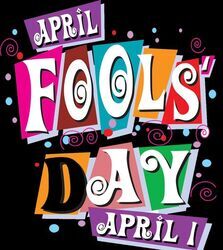April Fool
 In 16th century France, New Year’s Day was 25 March. People feasted for a week until the end of the celebrations on 1 April. However, in 1564 the calendar was officially changed from the Julian version to the Gregorian version so that New Year’s Day now fell on 1 January—a slightly more drastic change than moving the clocks back or ahead an hour for Daylight Saving.
In 16th century France, New Year’s Day was 25 March. People feasted for a week until the end of the celebrations on 1 April. However, in 1564 the calendar was officially changed from the Julian version to the Gregorian version so that New Year’s Day now fell on 1 January—a slightly more drastic change than moving the clocks back or ahead an hour for Daylight Saving.People who would not accept this change continued to celebrate on 1 April and for this reason were called ‘April Fish’ and were given mock presents. This custom spread to other countries where the expression became April Fool.
The term April Fool came to English in the 1680s as April-gowk from Old Norse gaukr (cuckoo).
April Fool’s Day, originally All Fool’s Day, appears in 1712. The April Fool’s Day tradition of sending people on false errands seems to have come to England from France in the 17th century. In some parts of England, the 1st of May was the day for hoaxing. The fool was called a ‘May gosling’.
Today, April Fools is a day for harmless and good-natured practical jokes and hoaxes. Traditionally, you can only play April Fools pranks until midday—after that the joke is on you.
“In one famous prank in 1957, the BBC broadcast a film in their current affairs series purporting to show Swiss farmers picking freshly-grown spaghetti, in what they called the Swiss spaghetti harvest. The BBC was soon flooded with requests to purchase a spaghetti plant, forcing them to declare the film a hoax on the news the next day” (Wikipedia).
https://www.youtube.com/watch?v=tVo_wkxH9dU&ab_channel=MySwitzerland
The word Aprilis came to English in the 12th century from Latin Aprilis which was the second month of the old Roman calendar. Aprilis likely comes from Latin aperilis (the next, the following) or from Apru, an Etruscan form of Greek Aphrodite. Aprilis replaced the Old English word Eastermonao (a fertility goddess). The word Apprile, later April, first appears in the 14th century.
The word fool, from the early 13th century, meaning a silly, stupid, or ignorant person, comes from Old French fol (madman, idiot, rogue, jester). Old French fol was also a blacksmith’s bellows (suggesting perhaps that a fool was a ‘blow hard’!).
The verb ‘to fool’ (to be foolish, to act the fool) is from the mid-14th century. The phrase ‘to make a fool of’ is from the 1590s. To fool, meaning to cheat, is from the 1640s. In the late 19th century, ‘to fool around’ was to pass the time idly. By the 1970s, ‘to fool around’ also meant to play around sexually.
The word fool also has some less common meanings. In the 14th century, the word fool meant a prostitute. A fool, a type of English custard dessert sometimes also called a trifle, is from the 1590s.
Reference: Online Etymological Dictionary, https://www.etymonline.com/
Published on April 01, 2022 07:44
No comments have been added yet.



